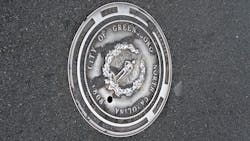With a population of 270,000, Greensboro, North Carolina, is a genuinely big city, and it’s also part of the Piedmont Triad, the nation’s 30th largest metro area—all told, Greensboro Asphalt Section Supervisor Jordan Lambeth is responsible for the maintenance of about 4,000 lane miles. “And a lot of our infrastructure is over a hundred years old,” he points out. “So we are always doing a lot of repaving and maintenance.”
In 2000, Greensboro began using the American Highway Products Pivoted Turnbuckle Manhole Riser to raise manholes to grade after asphalt overlays or simply to raise manholes that have subsided over time. Lambeth knows the risers well—he’s been involved in city road maintenance for eleven years, and has spent plenty of time on crews actually installing them. He’s raised manholes the other way, too; “We used to raise all our manholes by jackhammering up the old frames, raising them with concrete rings, and then paving around them. It could take half a day.”
All that effort didn’t add up to better quality. “The first time I used these risers, it was in response to an issue we were having after overlay projects,” Lambeth says. “Basically, all the paving was good—except around manholes. Either we left depressions around the manhole, where we pulled back hot asphalt without raising the lid—that made the manholes into potholes. Or we’d spend half a day raising a manhole after an overlay, and the jackhammering and patching would compromise the new pavement.”
Lambeth’s department keeps four eight-man city crews busy all year on paving projects and roadway repairs. On these projects, the AHP risers are always used, and Lambeth says that adds up to more than a hundred manhole risers installed annually, plus about 75 water valve risers, also made by American Highway Products.
The “Pivoted Turnbuckle” is the key advantage for Greensboro; it allows crews to slip a riser of appropriate thickness into the original rim, adjust it to match sloped paving, and then use a screwdriver (as a lever) to twist the turnbuckle and exert 1,000s of pounds of mechanical force. This sets the riser tightly and securely. “It takes five minutes, tops, and we’ve never had one fail,” Lambeth says. “Even in winter, when we’re snowplowing, they do fine because they’re set so close to grade.” Greensboro has looked at other adjustable risers, such as those set with allen screws, but hasn’t found anything that works as well. “They’d pop out and everyone would fuss,” Lambeth explains.
“They take five minutes to install, compared to half a day, they don’t fail, and because they’re at grade they improve ride quality for our drivers,” Lambeth says. “So why would we use anything else?”
Editor's Note: Scranton Gillette Communications and the SGC Infrastructure Group are not liable for the accuracy, efficacy and validity of the claims made in this piece. The views expressed in this content do not reflect the position of the Roads & Bridges' Editorial Team.

